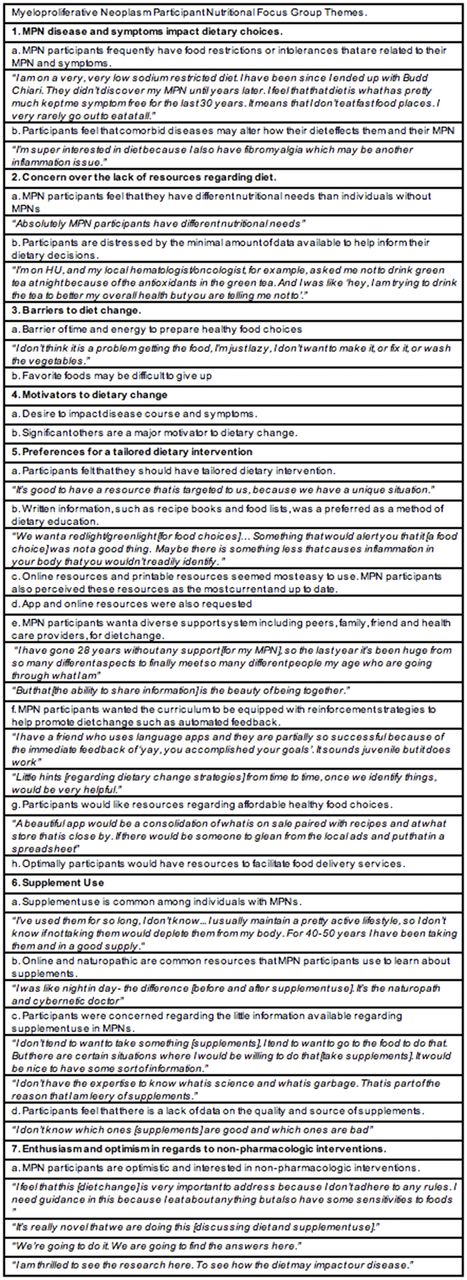Abstract
Background: The myeloproliferative neoplasms (MPNs) are a type of hematologic malignancy with severe symptom burden and increased inflammation. Therapeutic intervention is focused on patients with advanced disease with limited options for patients with indolent disease. Changes in diet, particularly alterations that highlight foods with anti-inflammatory properties, have been effective in controlling inflammation and symptoms in other disease states. To date no dietary interventions have been evaluated among MPN participants.
Methods: Focus group participants consisted of MPN participants recruited from the "We are MPN" participant conference in Irvine, California in April 2017. Participants were asked to complete a demographic and disease-related questionnaire, undergo a blood draw and body fat composition testing, and participate in a focus group regarding nutritional needs and preferences. The focus group was held following the conference and thematic analysis was used to analyze the transcript. Thematic analysis was coded, reviewed, and agreed upon by study coinvestigators.
Results: Demographics and disease features: Thirteen individuals diagnosed with MPN agreed to participate in the study. The majority of the participants were female (77%). Approximately half (45.5%) lived near the conference. The average age of participants was 53.6 years old (range 23-77). Participants included those with an ET (45.5%), PV (36.4%), and MF (18.2%) diagnosis. Average BMI was 22.3kg/m2 (range 17.8-26.9) with a mean percentage body fat of 29% (range 8.4%-40.3%). The mean waist circumference was 80cm (range 68-91). The majority (81%) of Participants noted having a stable weight over the last 6 months (81.8%). Mean MPN-10 score was 21.5.
Focus Group Themes: 11 participants were able to stay following the conference to participate in the focus group. Seven themes were identified as detailed in Table 1. MPN participants frequently reported food restrictions or intolerances that were related to their MPN and symptoms. Participants are distressed by the minimal amount of data available to help inform their dietary decisions. Time, energy, and motivation were barriers to preparing optimal dietary choices.
Interventional preferences: Participants felt that they should have an intervention tailored to their specific MPN-related needs and preferences.Participants felt that recipe books and food lists through online resources and printed resources were easiest to use and most up to date. Participants preferred a diverse support system including peers, family, friend and health care providers to help enable dietary change. Participants raised the idea of interacting with each other with a curriculum equipped with strategies to help promote diet change . Optimally participants would be provided with automated immediate feedback regarding diet.
Supplement use : Supplement use is common among individuals with MPNs. Participants often use online and naturopathic resources to learn about supplements.Participants were concerned about the lack of information regarding supplement use in MPNs as well as the source and quality of supplements. Finally, participants demonstrated enthusiasm and optimism in regards to non-pharmacologic interventions to alter symptom burden and/or disease course.
Conclusion: Participants with MPNs are very motivated to implement dietary changes or initiate supplement use and are highly enthusiastic about the opportunity to alter their disease course or symptom burden. Further exploration of interventions that align with participant's needs and preferences for nutritional interventions including dietary change and supplement are being planned for investigation.
Mesa: Ariad: Consultancy; CTI BioPharma Corp.: Research Funding; Incyte Corporation: Research Funding; Celgene Corporation: Research Funding; Gilead Sciences, Inc.: Research Funding; Promedico: Research Funding; Novartis Pharmaceuticals Corporation: Consultancy; Galena Biopharma, Inc.: Consultancy.
Author notes
Asterisk with author names denotes non-ASH members.


This feature is available to Subscribers Only
Sign In or Create an Account Close Modal